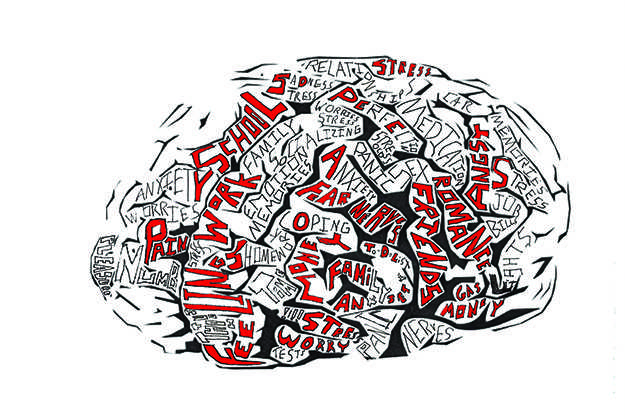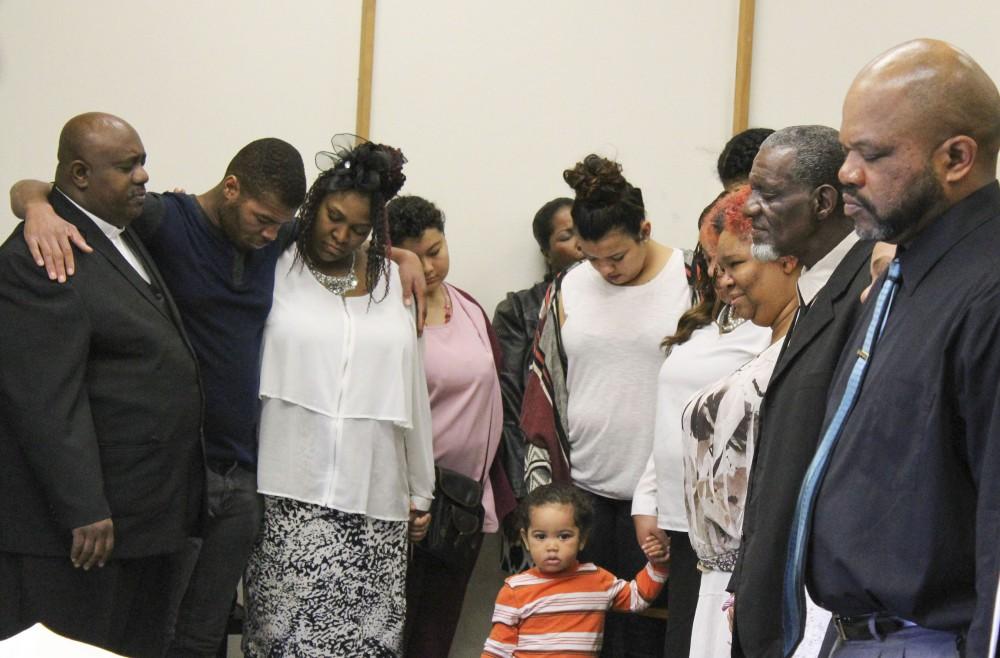Heart races, breathing becomes uneven and palms are sweaty. It’s not just nerves.
A rush of emotions and memories surge through, and then everything becomes numb. There’s no movement, just hyperventilation.
Some time later there’s crying, and then the tears are wiped away as the experience is slowly pushed out of mind.
Anxiety attacks, or panic attacks, differ from person to person, as well as the methods used to help manage anxiety.
“Anxiety causes people to avoid things that are important to them (especially social anxiety),” said Dr. Robin Kirk, owner and director of Sage Psychotherapy Associates, where they specialize in mindfulness and acceptance therapy for those who have anxiety.
Kirk explained that aspects of social anxiety can affect people’s friendships, saying, “They can go to a party and decide to leave because they feel uncomfortable in the situation. It narrows their choices,” when it comes to social outings.
Jon James, coordinator and counselor at Disabled Student Programs and Services (DSPS) at American River College gave his insight on anxiety.
“Anxiety is not a disability. Anxiety is a symptom of an underlying cause,” said James. “Anxiety is a natural phenomena and anxiety is a great thing in life because without anxiety you would never get anything done.”
Although in most cases, a normal amount of anxiety isn’t enough to cause anxiety attacks.
“Anxiety is another word for motivation. A certain amount of anxiety is extremely beneficial because it puts your body on high alert,” said James. “However, if anxiety becomes excessive, like anything, it becomes a bad thing. It could become a blocking thing.”
Which is when anxiety attacks occur. An anxiety attack can last anywhere between a few minutes to a few hours.
Kirk also explained that when a person experiences an anxiety attack, they could feel as if they are having a heart attack.
That’s where the breathing plays a big role. During an anxiety attack, hyperventilation will most likely occur, which in turn causes one’s heart rate to go up.
In everyday lives, when anxiety becomes too much, a person has to stop whatever it is they are doing in order to get themselves back on track. It may take hours or a few minutes, but that time is necessary in order to regroup.
Anxiety and nerves are often seen as the same thing, but there is a clear distinction between someone who has anxiety and someone who is just nervous.
“Part of it is chronic versus situational (anxiety),” said Jane Adams, a counselor and professor who taught the health education stress and management class at ARC.
“It’s perfectly normal and reasonable to be stressed out over a midterm,” Adams continued. “But when that goes on after the test is over and when it’s constantly on your mind, and when it becomes more of a chronic thing that you’re thinking about all the time, every day, then I think that may separate the true state of chronic anxiety versus just something that’s normal. It’s situationally normal to be stressed out or anxious about a test.”
James talked about some of the sensations a person can feel when experiencing an anxiety attack.
“It can block cognition, where a student can’t think. It can block respiration, a student can’t breathe. It can cause other kinds of symptoms, such as nausea, sweating and all kinds of different things can happen as a result of anxiety.”
That’s when things can become blurry. The world becomes blank, things are out of focus, and the voices that continue talking get washed out.
“Then we can talk about what’s causing the anxiety,” said James. “Because again, anxiety in and of itself is not a disability. Now, it is a handicap, when you start to talk about if it’s something that influences or bothers or hurts people, disrupts a person, yes, it sure does.”
In students, Kirk said that they often can have difficult times when taking tests. They tend to do less well than others, and they forget the things that they have already learned and know.
Kirk also explained that anxiety could lead to perfectionism and even OCD. “It could be hard to start a project or finish it, which can lead to late assignments
and poor performance on exams,” she said.
“Anxiety disorder forms mostly an impact on life that is pervasive,” said Kirk. “Worry causes distress in their life on a fairly significant level.”
It isn’t just worrying about having enough free time.
Clinical anxiety can cause a person to worry about every aspect of his or her life, which includes things that he or she may already know are not problems.
“People with anxiety tend to find ways to self medicate in order to try and alleviate the excessive stress they could be having,” Kirk said.
Adams talked about mindfulness as a way to help cope with anxiety. “If you stay in the present moment, you don’t have thoughts of the past and you don’t have worries about the future. You try to focus on what’s going on right now.”
Another example of something that can cause anxiety is registering for classes.
“Sometimes students become very anxious about their class schedules,” said James. “But every student feels it. You plan your schedule, and you go in to enter it and you think ‘Please. I don’t want to be on the waiting list,’ So when we (DSPS) offer priority registration, we take away that factor.”
Students then know exactly what classes they are going to get, and it takes away the element of the unknown that can cause major anxiety.
In another situation, a person could have anxiety when it comes time to go to work. A person could be afraid of the unknown, and it can eventually cause them to have problems in their workplace because of their anxiety.
“A person who lives with anxiety understands how to negotiate, navigate and manage their anxiety in the world, but they may not know how to do it in a college environment,” said James.
The main part of being able to better manage anxiety in a college environment, or any environment, is to communicate with people about one’s anxiety.
“It’s this more nagging, chronic piece that is there,” said Adams. “I think anxiety shows up in things you can’t control. So, worrying about things that maybe haven’t even happened yet. Worrying about, ‘Will I ever transfer?’ all these things that keep a person up at night. Those are more the chronic issues we see.”
The main difference between anxiety and nerves is that when a person is nervous, it is usually about one particular event that is going to happen. Anxiety can keep a person worrying over everything, and the worrying eventually takes control of their life.














Angel • Dec 1, 2014 at 5:28 pm
I have social anxiety, and it’ something I’ve struggled with for years now. I’m starting college again the beginning of next year, and I’m extremely nervous. I’m trying my best to get over it on my own, telling myself that I’m fine and everything’s okay. It works to an extent, but then other thoughts pop into mind. Will I be laughed at, or looked at for certain things. I don’t exactly have the perfect smile, which is something that holds me back from a lot of things. There’s so much I wanna achieve in life, and it’s a struggle to push forward with this holding me back. The article was great, I’m glad this topic was posted.